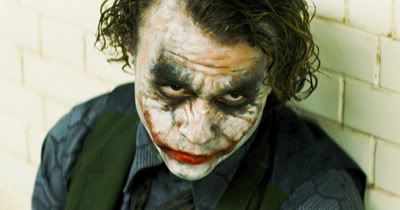
Referring to the The Dark Knight as a “comic book” or “superhero” movie seems to diminish its greatness. This is not light summer entertainment that will leave you when you leave the theater. Christopher Nolan’s sequel to his 2005 origin story Batman Begins is a dark, foreboding picture that grapples with very real issues of heroism and villainy, order and chaos.
The tragedy of Heath Ledger, whose maniacal performance as The Joker will become the stuff of movie legend, casts an even greater pall.
When an Oscar nomination comes early next year, cynics surely will say it is only due to Ledger’s death last January from an accidental prescription drug overdose. Don’t listen to them. His work here is mesmerizing, magnetic. You can’t keep your eyes off of him. He upstages everyone in a cast that includes the likes of Christian Bale, Michael Caine, Gary Oldman and Morgan Freeman.
Unlike Jack Nicholson’s take on the character in Tim Burton’s Batman (1989), Ledger’s Joker is a frightening creation, with a tangled mess of hair that looks like it’s never been washed, greasy white facepaint that streaks and deteriorates as the movie progresses, dark eye shadow and sloppily applied red lipstick. He tells two entirely different stories to explain the scars that keep his face locked in a permanent smile. He shuffles and shambles about, speaks in an off-putting cadence, with pauses to lick his lips, almost lizardlike.
This Joker has little use for the mob or any other form of organization. He is a terrorist—his introduction comes during a bank robbery filmed with Michael Mann-like intensity—and bombs are his preferred weapons. “I am an agent of chaos,” he explains.
He appears in Gotham with no backstory. The closest we get to an explanation comes from Alfred (Caine), Bruce Wayne’s (Bale) loyal butler: “Some men just want to watch the world burn.”
The Joker first goes to the mobsters, who are feeling the pinch from an aggressive campaign waged against them by Batman, the hard-working cop Lt. Jim Gordon (Oldman) and Gotham’s new district attorney, Harvey Dent (Aaron Eckhart). The Joker’s plan: Kill Batman. He issues a call for the Caped Crusader to reveal his identity; if he doesn’t, people will die. When Batman doesn’t comply, The Joker targets the police commissioner (Colin McFarlane), Gotham’s mayor (Nestor Carbonell) and Rachel Dawes (Maggie Gyllenhaal, ably replacing Katie Holmes), Bruce Wayne’s one true love, now Dent’s girlfriend.
The Joker has other plans for Dent, a crusader in his own right who has been anointed “Gotham’s White Knight.” Bruce sees Dent as the hero Gotham needs, a hero with a face. The need for Batman might be ending, he dares to hope. But the line between hero and villain is a fine one. “You either die a hero or you live long enough to see yourself become the villain,” Dent says, the poignancy coming from knowing that at some point he will become the villainous Two-Face.
Killing Batman isn’t in The Joker’s cards either. As he observes, Batman won’t kill him for moral reasons and he won’t kill Batman because he’s having too much fun in what, for him, has become a co-dependent relationship. “You complete me,” he says, the statement never sounding more twisted.
In lesser hands, The Joker could be nothing more than a caricature, a living cartoon. Ledger, working from a screenplay by Nolan and his brother Jonathan Nolan, brings him to terrifying life, creating an endlessly fascinating character who serves as the engine that runs the whole film.
It is The Joker’s emergence that causes Bruce to doubt himself. He meant for Batman to inspire people to do good; instead, he has helped create, as The Joker refers to himself, “a better class of criminal.” Bale is the definitive Batman, and the nuances of his portrayal, which were already present in Batman Begins, go even deeper here.
Among the supporting cast, Oldman is, even as he reprises his role, something of a revelation playing a decent man rather than a villain, as he typically is cast in Hollywood productions. Caine and Freeman, as Lucius Fox, the man who creates most of Batman’s weapons and gadgets, are as compelling as ever. Both play characters who mentor Bruce and serve as his conscience, always there to catch him when he’s about to go over the edge.
This is a big action movie, with real cars, real stunts and real explosions. But it is the psychological drama that makes it one of the great modern crime epics, constructed and edited with the confidence and energy of Martin Scorsese’s best work. The Dark Knight is a masterpiece, easily the strongest effort in the history of its genre and one of the best movies of the decade.
GRADE: A+
(Rated PG-13 for intense sequences of violence and some menace. 152 minutes.)
2 comments:
This is a terrific review! I screened the film myself at midnight on Thursday evening and I would have to say that you describe Nolan's ambition to make a sprawling, intricate, layered and serious meditation on what it would mean for a costumed vigilante to introduce himself into a modern crime-ridden urban metropolis (no pun intended) quite meticulously and accurately. One can only hope that this entry will continue the recent trend of comic-inspired adaptations to depict a more realistic and mature world for their characters to inhabit, albeit not at the expense of the filmmakers' imagination.
i still wish Katie Holmes had stayed on board as Rachel Dawes for the Dark Knight; it was like the time spent getting familiar with her character in Batman Begins was wasted...
Post a Comment